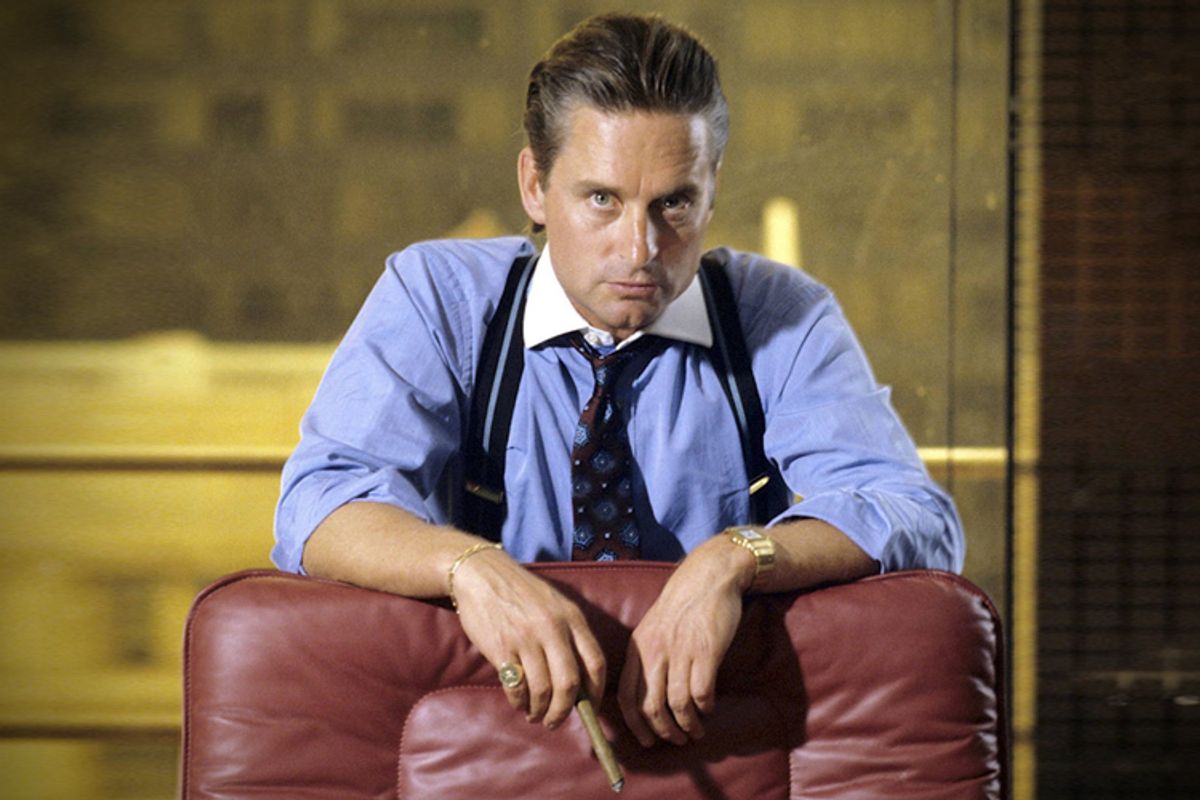Flood Wall Street, Monday's more radical follow-up to the People's Climate March, is garnering a strange breed of criticism -- one that appears to miss the protestors' point entirely. "An ironic flood on Wall Street," quipped the Wall Street Journal, while the Daily Beast trolled the protestors by proclaiming, "Capitalism is saving the climate, you hippies." Their reasoning? Wall Street's made some business-friendly investments in renewable energy lately; ergo, their goals and the goals of climate activists are actually one and the same.
No one's arguing that we can spur a worldwide energy transformation without private capital, or that, as the Daily Beast characterizes the protestors' position, that we're going to "crowdfund [our] way to stopping climate change." Major financial institutions, seeing an opportunity to make money in ways that also promote renewable energy, efficiency and sustainability, have no problem seizing it (and playing it up). Environmentalists, while perhaps suspicious of how genuine those firms' eco-friendly rhetoric really is, aren't arguing that they should stop funding solar panels. And no one's arguing that the folks on Wall Street are the only ones standing in the way of climate action. The main barrier to a carbon tax , after all, isn't big business: Plenty are already factoring an inevitable price on carbon into their long-term business plans. The problem, now as always, is Republicans.
It's true, also, that the economy has been favoring green investments, and that investors know that a failure to act on climate change is going to hurt them, too. Major investment firms, for example, have acknowledged that they don't see much of a future in coal. But in 2013, U.S. investment banks still poured $31.7 billion into the "worst-of-the-worst U.S. coal mining and coal-fired power companies," according to a report from Rainforest Action Network, the Sierra Club and BankTrack. That's money that, if divested from coal, would make a hell of a lot more of a tangible difference than Stanford's. As Tim Donovan pointed out at Salon, this was a huge (and largely unplayed) hand for the Flood Wall Street protests: they could have demanded that large financial institutions stop funding fossil fuels.
And while the International Energy Agency estimates that the world will need over $10 trillion in renewable investments between now and 2050 to prevent the planet from surpassing two degrees of warming, Climate Progress points out that such investments amounted to only $254 billion in 2013. "Meanwhile," he writes, "about $22 trillion of the world’s oil, coal, and natural gas reserves would have to stay in the ground to avoid reaching that level of warming."
No one's arguing that there's no role for the market in solving the climate crisis. As Naomi Klein, who spoke at the protest, herself told Salon, "I definitely think there’s a role for the market in solving this crisis." But, the time has come for drastic action, she continued, and unchecked capitalism is getting in the way. "We now need to cut our emissions so rapidly and so deeply," Klein said, "that it poses a challenge to the logic of growth for growth’s sake."
She continued:
Yes, we want to grow renewable energy. But no, we can’t just grow all forms of consumption. Some consumption needs to contract. That’s the clash. It’s not just saying there’s no role for green businesses. Absolutely there is, but at the same time, we can’t leave it to green businesses to just do this for us. I think sometimes there’s a confusion: “OK, so these companies are thriving and doing well; that means the market can fix this for us.” It can get us partway there but it can’t get us to zero, which is actually where we need to go in an alarmingly short time. Regulation will get us there. Big public investments will get us there. And a more strategic economy will get us there. In combination.
The protestors weren't calling for an end to capitalism, they were calling for an end to capitalism as it's currently practiced. As such, Klein argues, we need systemic change, not just a few climate-friendly investments. Change this extreme, this quickly, she adds, needs a moral incentive in addition to an economic one, and it needs both public pressure and government regulation to push it along.
And morals, as both the Daily Beast and the WSJ acknowledged, don't factor into Wall Street's business plan. Opportunism does. Investors have figured out that they can make money off the innovations needed to fight climate change, like renewable energy, and to adapt to its effects, like flood barriers. They also can -- and do -- make money off climate change, period. Mckenzie Funk documented this opportunism in his book, Windfall. A classic example he gives is the melting Arctic: it's opening new trade routes; presenting new places for oil companies to drill; and providing one one entrepreneur with the raw material for special "iceberg vodka." You can bet there are already travel companies jumping on the New York Times' prediction that by the end of the century, Alaska will be the new Florida.
Funk's takeaway, as he told Salon: "I think that people are betting on failure, they’re going to bet on success, and they are going to do them both at the same time. They’ll try to make money on whichever future turns out."

Shares